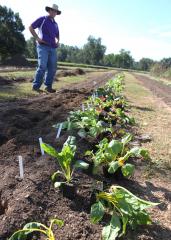
Assistant Professor of Horticulture Dr. Jared Barnes lays out 15 different cultivars of Swiss chard to begin a winter trial determining the best performing varieties for East Texas’ fall and winter growing seasons.
The colors are courtesy of 15 different Swiss chard cultivars recently planted by Dr. Jared Barnes, Stephen F. Austin State University assistant

The 15 varieties of Swiss chard used in the trial feature a variety of colors, which make the plants a promising option for gardeners who desire both edible and ornamental qualities in their plants.
“It’s going to be a lot of fun to come back in a couple of weeks and look up and down through here, see them all growing up and see a rainbow across these beds,” Barnes said.
But don’t let their beauty fool you. These vegetables are more than just ornamental plants. Swiss chard is nutritionally dense and provides an assortment of vitamins and minerals. Barnes says its combination of beauty, adaptability and nutrition is the primary reason he chose the plant for the winter trial.
“More and more what you’re seeing from people who are interested in buying plants is they want plants to have multiple functions,” Barnes said. “They want it to be edible and pretty. They want it to be pretty and smell nice on their patio. They want it to be small so it can grow in a pot and have foliage color.”
Barnes explained that Swiss chard encapsulates many of these qualities, and as a cool weather crop, it can perform well during Texas’ winter growing season.
The trial will be conducted over two seasons and compare the success rates of cultivars that are left exposed to the elements versus those that are protected by row covers. The results, which Barnes hopes to publish, will provide gardeners insight into which cultivation method is best and what varieties are best suited for the region’s fall and winter gardens.
“There’s a weather station across the road, so we’ll be able to collect data very, very close by,” Barnes said.
Thermometers installed in the rows also will provide insight into the soil’s temperature variations between the two growing methods.
Barnes explained that he hopes this trial also will bring awareness to the opportunities offered by the winter growing season, which he believes is often overshadowed by the spring and summer growing period.
SFA Gardens student employee Jordan McGee agrees. A senior horticulture major, she discussed her passion for small-scale, personal food production as she and fellow horticulture student Aaron Chambers kneeled over a row of Chinese cabbage. They both agree that the opportunity to participate in trials such as this one greatly benefit their education and serve as a way to inform the public of the benefits and opportunities of growing their own food.
The first eight beds in the trial garden area will be dedicated to producing and trialing food crops throughout the year. The remaining beds, located next to SFA’s intramural fields, will be used for ornamental and non-food plant trials.



